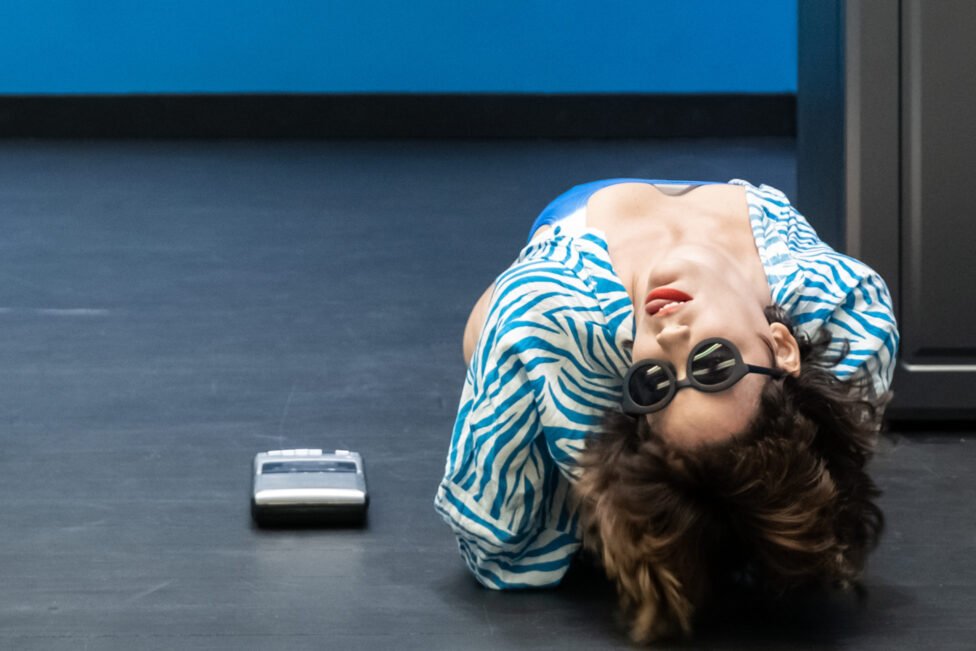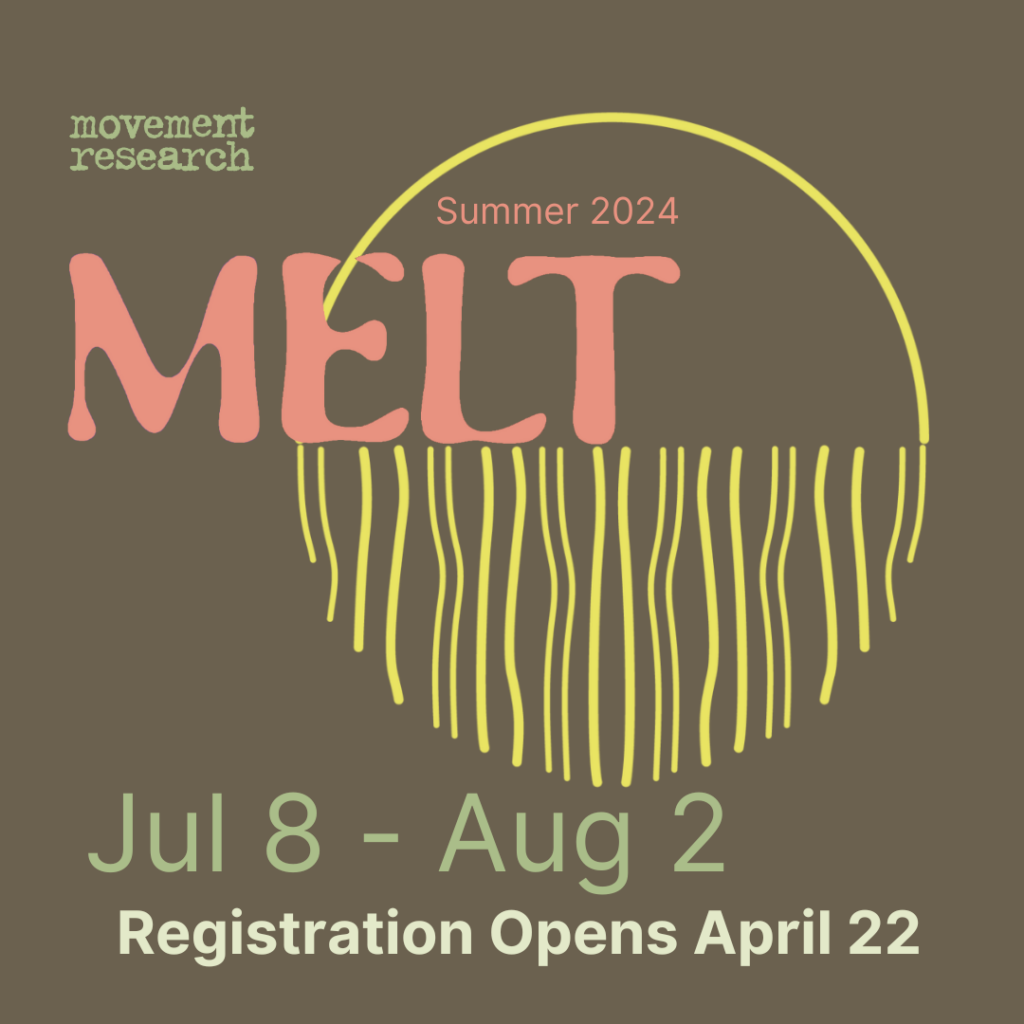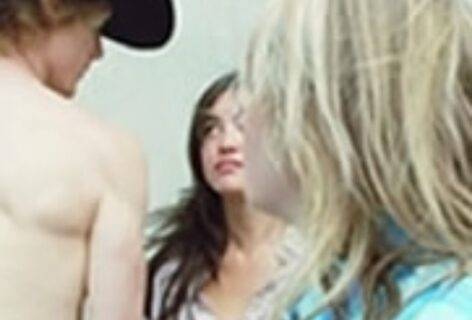Xandra Ibarra: We both have some overlapping interests in exhaustion, laziness, and interspecies performance in our works. And we know artists’ works embody their politics; the affects, poetics, vocabulary, and aesthetic approaches enact a practice of social critique from their respective social positions. Por ejemplo, I often view my own work/body as an unresolved split of juxtaposed meanings; a fleshy border encountering the interplay of humor, erotics, language, aesthetics, and time in halves. No solo una mitad pero un monton de halves that refuse notions of wholeness. I use my work to reorient myself and my politics. Quiero decir que… I don’t know what I think/how I relate until I begin to create. What are some of the significant features in your work now that formulate your knowledge production?
nibia pastrana santiago: I think this ‘refusal’ es una manera de estar-y-ser en el mundo which is inescapable. I don’t want to sound like a fatalist, cuando digo: in-es-ca-pa-ble, which by the way as I write it I realize it has the same spelling in English and Español (the in refers to opposite of). Entonces, in my work I actively refuse the completion and singularity of an idea or image. I am interested in ambiguity as a performance state, a conceptual framework y como tú te imaginas it is also directly related to my identity as Puerto Rican or better said the Puerto Rican condition. To identify oneself, and one’s practice in this “unresolved slip” is something that we both share. This slip, this liquid space, es una cosa que claramente condiciona what’s produced, however what is produced also challenges my own assumptions about identity, esthetics and language. In this sense, nuestrxs trabajos están vivos, vivas, vivxs, alive. Lo que te quería decir, es que in order for questions to appear, I engage in the practice. I usually define specific conceptual containers in order to experiment with materials and time to encounter something new about algo. Por ejemplo, considering laziness; en mi trabajo time spent is very important. For example, no te puedes poner vaga for two minutes, I mean one could be lazy for that amount of time, but I mean para que el laziness really manifests, there are things to be considered: how long does it take to ‘become’ (devenir) lazy, or to arrive physically and ideologically to idleness? where does that take you in performance? what are the circumstances that can give a particular shape to these politics? Me gustaría que me contaras más on how your practice arrived to considerations on laziness and exhaustion. For me it started by “doing nothing”… I wonder if laziness was your initial entry point, or if you developed other similar strategies.
XI: My entry points were affects like zany and hyper-irritation, I was working with the fast-paced physicality exploring spectacle through the use of a parodic racialized femininity. I was performing as La Chica Boom in nightlife cultures like drag, burlesque, and bdsm and I felt overburdened by my raciality in those scenes. So instead of running away from it, I ran towards it como una borracha usando perico. I began to use various racial signifiers, myself, and hyper-incessant movement to facilitate an irritated, disgruntled, zany posture to index the complexity of how I anticipated being consumed in nightlife culture. I was thinking of the “gaze” as expectation. I wasn’t returning the gaze per se but trying to see if I could create a politic of daily violence that contends with pleasure by being what I called a spictacle. I did find pleasure for myself but also became exhausted emotionally and physically. So, I took a break from La Chica Boom and started to explore the concept of exhaustion via other disciplines like photography, interactive media, and sculpture. I admit I had way to many projects with the word exhaustion during this time! Like “Inventory of Exhaustion” and “Training for Exhaustion.” Pero in terms of performance, my work took a turn toward the languid, sensorial y eso me hizo frenar y moverme mas despacio. I was still insisting on pleasure but within more languid sensorial compositions, trying to sink into a new language and consider other grammars of embodiment – those that moved away from the zany and the signifying functions of the racialized body. I was moving in a languorous unenergetic way and also using my voice to produce ugly guttural singing. I considered this movement and sound lazy at the time. But for me, this is the lazy after the exhaustion, where I am whispering, “I am less here” and moving like a slug. I suppose my lazy was not fully manifested. Bueno ya sabes, soy un poco neurótica so it’s hard for me to slow down. Next time, I should just not show up for the show! Ja ja ja Me interesa tu lazy y también el refusal de completar una idea o una imagen. Me parece muy punk/anti-capitalista; disloyal to normative modes of performance. Oye! I am not gonna ignore that you were just invited to the Whitney Biennial….CABRONA! GET IT! You deserve it cien por ciento. If you are comfortable, can you tell me about the concepts that are driving your work for that performance?
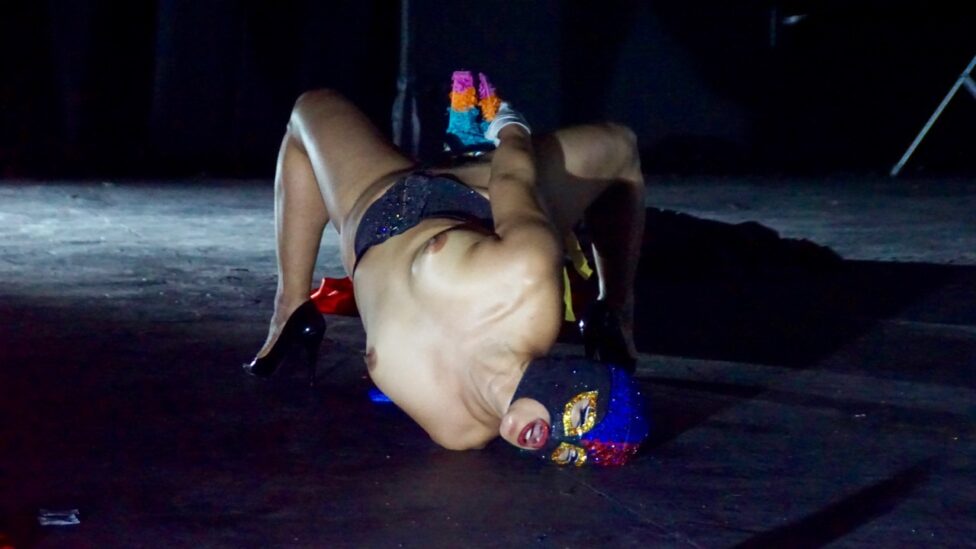
Xandra Ibarra, Live Performance of Dominatriz del Barrio, Photograph by Whitney Devon.
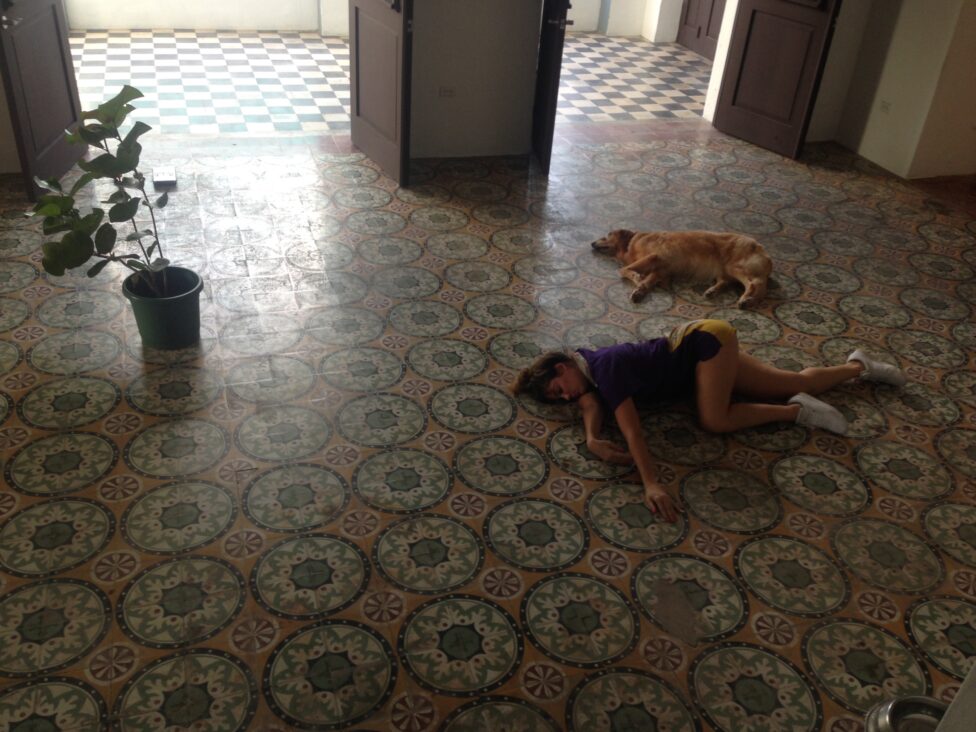
nibia pastrana santiago, Danza actual o el evento coreográfico: estructuras temporales para provocar un evento imposible (Current dance or the choreographic event: temporal structures to provoke an impossible event), 2015, Beta Local, PR. Photograph: Tony Cruz
nps: Ay Xandra! Mi vaga preferida, me encanta como describes tu research. Nah! Fuck the term research, I mean the way you eres-y-estás-en-el-mundo. Eso, how you describe saturation from being the brown cuerpo en escena, the inescapability of some “affirmation of appearance” and the power struggle that comes with that, specifically in the scenes La Chica Boom moves. PERO TÚ con tu SPICTACULAR strategies of subverting and torciendo la mirada del público, become autonomous. Lo entiendo porque a mí también, it gives me autonomía en la performance. And yes, like you said: es muy “punk/anti-capitalista” and also anti-colonial. Now, that you say this, it reminds me that before arriving to my “lazy dancer manifesto” in which I also claim things like “the lazy dancer has no duty to dance” and “the lazy dancer does not stand in the way of progress”, I was doing work about self-exotification, tourism and post-military territories. The body as place. Not that I really came to develop a strong body of work from that, but I was always negotiating imposed and preconceived notions of Latina, Nuyorican, Puerto Ricaness, hypersexualtropical and all the absurd things people think the Caribbean is, cause for lxs gringos El Caribe is their amusement rum themed backyard cabrones…ahhh me envolví…what I wanted to say is that I was always aware, especialmente in improvisation, of how opportunities of not-being-that and/or exhausting myself to-be-that served simultaneously to challenge and fail the tourists’ gaze, osea el gaze del audience. Bueno…. entonces para contestar tu pregunta, y gracias querida! Sí cabrona! I am excited to be part of the WB19, and also again, aware of all the controversy with Kanders, the museum, and how countless institutions are “enfangadas” con board members, bad money, etc. and considering strategies to deal with that context, yet again, not new, but a different scale. What I can say today is that I am going to disappoint, jajaja, si a todxs, lxs voy a decepcionar. This, as a performance motto como un sexy-fruitful limit where negation is one of the foundations for this particular work. I will be dealing with indisposition, some ideas around suspended inaugurations and enmarcándolo como un casi baile, an almost dance. I am still building my conceptual containers, pero yes, somehow echoing this constant state of being in-suspension. You know, even if I wanted to free myself from my identity, this colonial condition of failed promises is doing something violently rich to my artistic practice, which is deeply informed by the real.
XI: Hermosa, if you desire to disappoint, yo sé que lo vas a hacer con flo. Destroy it, negate it, be reluctant, be with and against, delay the foundation, never finish, never start, suspend your composition, casi baila y casi don’t. Do less, be punk, punk colonial logics. Me encanta amiga, I am excited to see how your work will approach the real material conditions that you and many others are experiencing in Puerto Rico.
nps: Xandra, ¿y tú? ¿Con qué estás trabajando ahora? What materials are you using?
XI: A ver materials…I am using a combination of fungus/mold, plaster, sex work accouterment, vacuums, other household items, and used car parts. I am combining these materials and their difference from each other into sculptural assemblages. I want to create a constellation of sculptures that anthropomorphize slippages between inanimate matter and the human that engender the body with a dynamic deviance that lingers in abjection. I am certain that my performance aesthetic and conceptual anchors just slipped into sculpture’s hole. It’s exciting for me to stick my hands in there and displace the body.
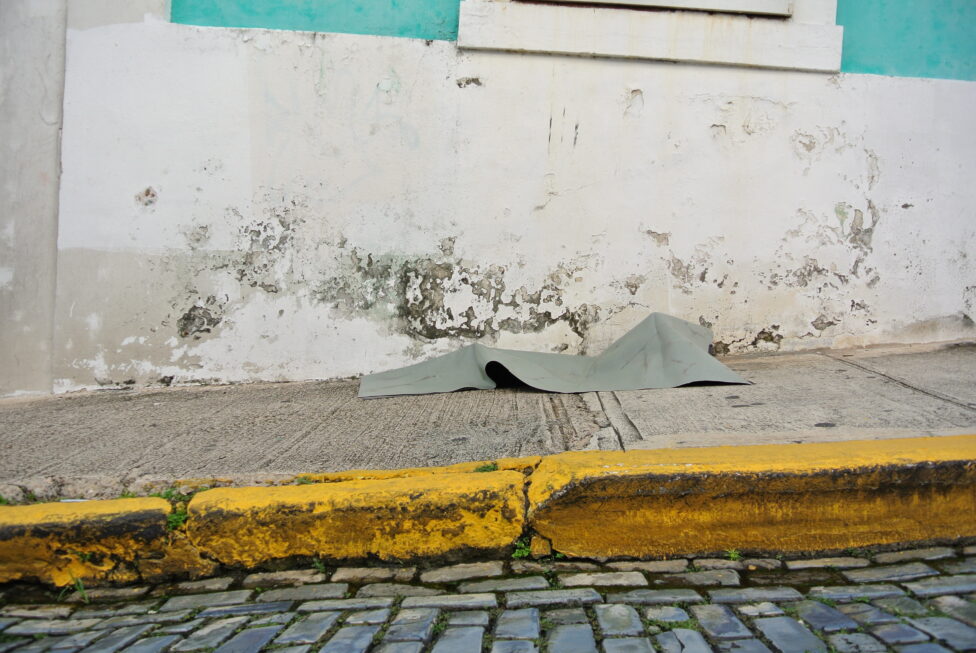
nibia pastrana santiago, residue, photographic series, material: marley floor the length of my body in BXL, SJU and NYC, 2013
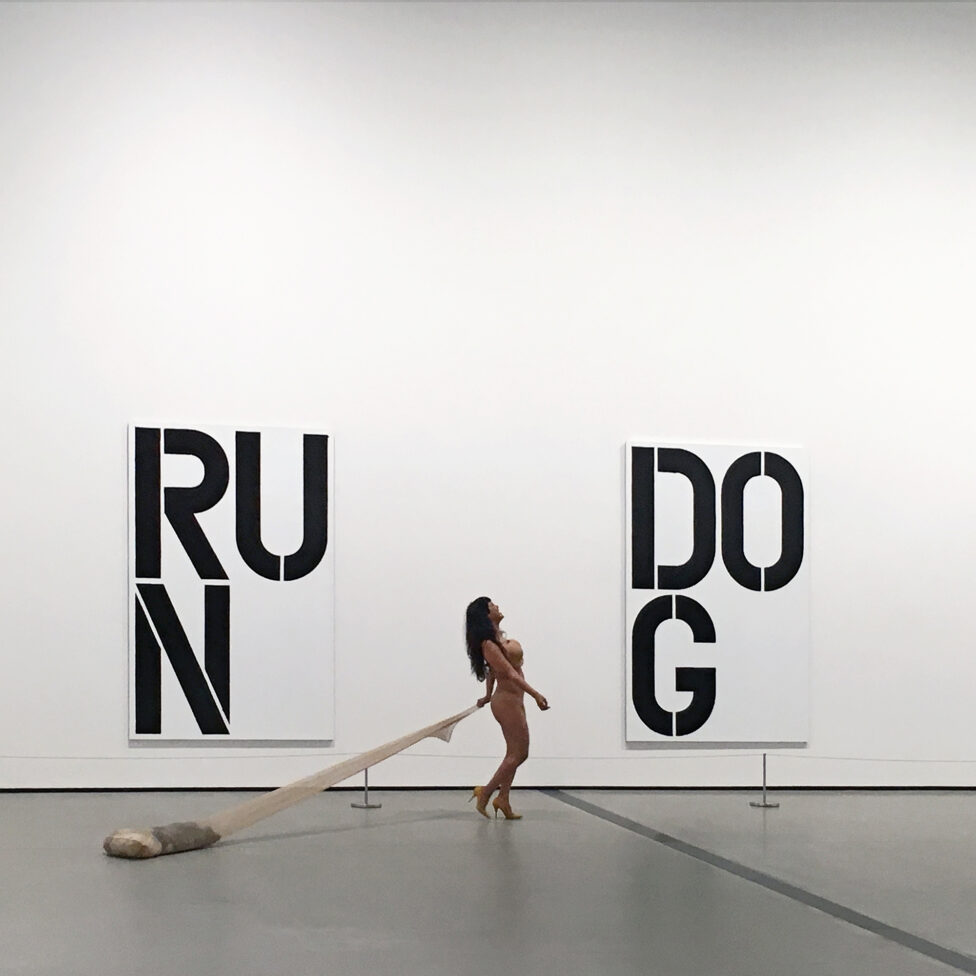
Xandra Ibarra, Live performance of Nude Laughing at The Broad Museum, Photograph by Jonathan Vel
nps: I am excited for you Xandra. ¡Qué bien que te fuiste por otro hoyo un rato! Seems that your physicality will continue to manifest con fuerza en los assemblages and las new modalities that you are pressing in your practice. Definitivamente me parece que estamos incidiendo en un momento where the experience of time (and its value) (and its performative value) is been, yet again, questioned. Yet our desires seem similar. I’m going to risk it and say it: abandoning the forms. In my case he tenido momentos muy significativos en que la dance and la choreography don’t always serve to resolve some of my questions y deseos. Yo creo que es importante abandonarlos ocasionalmente y take a day off, or a long time.
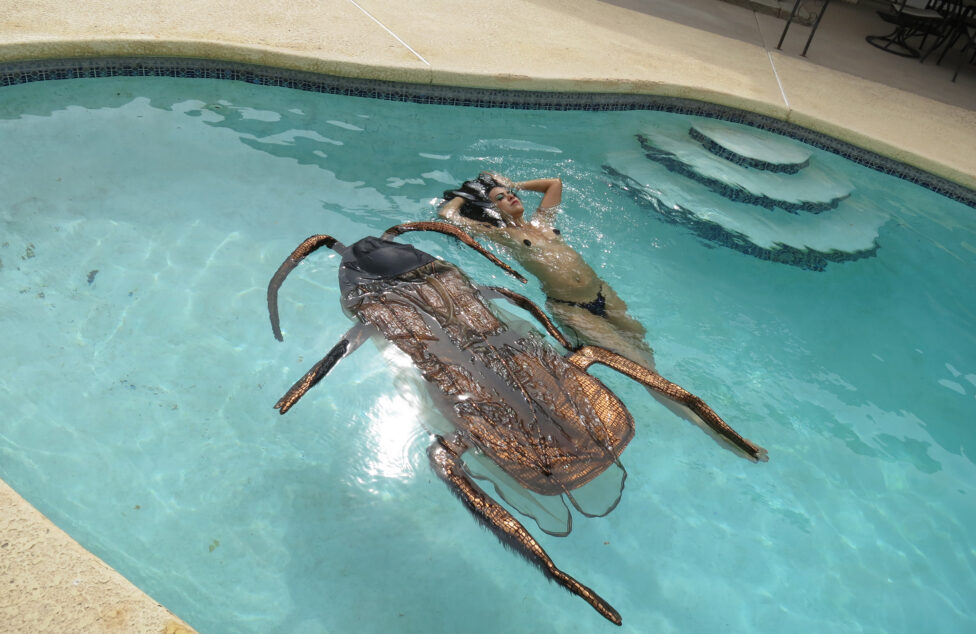
Xandra Ibarra, Molting in Pool from the series Spic in Ecdysis, 2015, Archival Pigment Print, 20″ x 30″

nibia pastrana santiago, condiciones materiales para la ficción y la fatiga (material conditions for fiction and fatigue) 2018, Casa de los Contrafuertes, PR
Photograph: Orlando Meléndez

